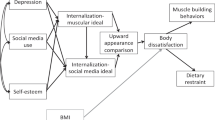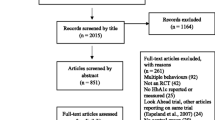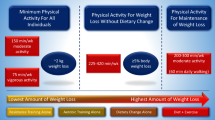Abstract
Behavioral theory suggests that treatments that increase participants’ use of self-regulatory skills and/or their feelings of ability (self-efficacy) will improve exercise and nutrition behaviors. In addition, psychosocial factors associated with increased exercise may carry over to improved eating. Self-regulation might enhance self-efficacy through feelings of ability to manage barriers to maintaining weight-loss behaviors. Sedentary adults with severe or morbid obesity (M age = 43 years; M BMI = 40.1 kg/m2) participated in a 6-month study within a community-based YMCA center. We randomly assigned participants to one of the two groups that incorporated the same cognitive-behavioral support of exercise paired with methods for controlled, healthy eating emphasizing either (a) self-efficacy (n = 138), or (b) self-regulation (n = 136) methods. Mixed model repeated measures ANOVAs indicated significant improvements in exercise- and eating-related self-regulation over 3 months, and exercise- and eating-related self-efficacy over 6 months. The Self-Regulation Treatment Group demonstrated greater improvements in self-regulation for eating and fruit and vegetable intake than the Self-Efficacy Group. Regression analyses indicated that for both exercise and eating, self-regulation change significantly predicted self-efficacy change. In separate equations, changes in exercise and fruit and vegetable intake mediated those relationships, and change in self-efficacy and the corresponding behavioral changes demonstrated reciprocal, mutually reinforcing, relationships. There was evidence of carry-over, or generalization, of both self-regulation and self-efficacy changes from an exercise context to an eating context. We discussed findings in terms of leveraging self-regulation to improve self-efficacy, and provide a rationale for why exercise is the strongest predictor of success with weight loss. Results may be used to inform future behavioral weight-management treatments through improved knowledge of relationships among theoretically derived psychosocial factors.

Similar content being viewed by others
References
American College of Sports Medicine. (2009). Appropriate physical activity intervention strategies for weight loss and prevention of weight regain for adults. Medicine and Science in Sports and Exercise, 42, 459–471.
Anderson, E. S., Winett, R. A., Wojcik, J. R., & Williams, D. M. (2010). Social cognitive mediators of change in a group randomized nutrition and physical activity intervention: Social support, self-efficacy, outcome expectations and self-regulation in the guide-to-health trial. Journal of Health Psychology, 15, 21–32.
Andrade, A. M., Coutinho, S. R., Silva, M. N., Mata, J., Vieira, P. N., Minderico, C. S., et al. (2010). The effect of physical activity on weight loss is mediated by eating self-regulation. Patient Education and Counseling, 79, 320–326.
Annesi, J. J. (2011). Moderation of fatigue and stress in the carry-over of self-regulation and self-efficacy for exercise to self-regulation and self-efficacy for managed eating. Psychology, 2, 694–699.
Annesi, J. J. (2012). Supported exercise improves controlled eating and weight through its effects on psychosocial factors: Extending a systematic research program toward treatment development. Permanente Journal, 16(1), 7–18.
Annesi, J. J., & Marti, C. N. (2011). Path analysis of cognitive-behavioral exercise treatment-induced changes in psychological factors leading to weight loss. Psychology and Health, 26, 1081–1098.
Annesi, J. J., Unruh, J. L., Marti, C. N., Gorjala, S., & Tennant, G. (2011). Effects of The Coach Approach intervention on adherence to exercise in obese women: Assessing mediation of social cognitive theory factors. Research Quarterly for Exercise and Sport, 82, 99–108.
Aronne, L. J. (2002). Classification of obesity and assessment of obesity-related health risks. Obesity Research, 10(Suppl. 2), S105–S115.
Baker, C. W., & Brownell, K. D. (2000). Physical activity and maintenance of weight loss: Physiological and psychological mechanisms. In C. Bouchard (Ed.), Physical activity and obesity (pp. 311–328). Champaign, IL: Human Kinetics.
Bandura, A. (1986). Social foundations of thought and action: A social cognitive theory. Englewood Cliffs, NJ: Prentice Hall.
Bandura, A. (1997). Self-efficacy: The exercise of control. New York, NY: Freeman.
Bandura, A. (2004). Health promotion by social cognitive means. Health Education and Behavior, 31, 143–164.
Bandura, A. (2005). The primacy of self-regulation in health promotion. Applied Psychology: An International Review, 54, 245–254.
Clark, M. M., Abrams, D. B., Niaura, R. S., Eaton, C. A., & Rossi, J. S. (1991). Self-efficacy in weight management. Journal of Consulting and Clinical Psychology, 59, 739–744.
Cooper, Z., Doll, H. A., Hawker, D. M., Byrne, S., Bonner, G., Eeley, E., et al. (2010). Testing a new cognitive behavioural treatment for obesity: A randomized controlled trial with three-year follow-up. Behavior Research and Therapy, 48, 706–713.
Flegal, K. M., Carroll, M. D., Kit, B. K., & Ogden, C. L. (2012). Prevalence of obesity and trends in the distribution of body mass index among US adults, 1999–2010. Journal of the American Medical Association, 307, 491–497.
Garber, C. E., Blissmer, B., Deschenes, M. R., Franklin, B. A., Lamonte, M. J., et al. (2011). Quantity and quality of exercise for developing and maintaining cardiorespiratory, musculoskeletal, and neuromotor fitness in apparently healthy adults: Guidance for prescribing exercise. Medicine and Science in Sports and Exercise, 43, 1334–1359.
Glymour, M. M., Weuve, J., Berkman, L. F., Kawachi, I., & Robins, J. M. (2005). When is baseline adjustment useful in analyses of change? An example with education and cognitive change. American Journal of Epidemiology, 162, 267–278.
Godin, G. (2011). The Godin-Shephard Leisure-Time Physical Activity Questionnaire. Health & Fitness Journal of Canada, 4(1), 18–22.
Godin, G., & Shephard, R. J. (1985). A simple method to assess exercise behavior in the community. Canadian Journal of Applied Sport Science, 10, 141–146.
Green, L. W., Sim, L., & Breiner, H. (Eds.). (2013). Evaluating obesity prevention efforts: A plan for measuring progress. Washington, DC: Institute of Medicine of the National Academies.
Hallam, J. S., & Petosa, R. (2004). The long-term impact of a four-session work-site intervention on selected social cognitive theory variables linked to adult exercise adherence. Health Education & Behavior, 31, 88–100.
Jeffery, R. W., Drewnowski, A., Epstein, L. H., Stunkard, A. J., Wilson, G. T., Wing, R. R., et al. (2000). Long-term maintenance of weight loss: Current status. Health Psychology, 19(Suppl), 5–16.
MacLean, P. S., Wing, R. R., Davidson, T., Epstein, L., Goodpaster, B., Hall, K. D., et al. (2015). NIH working group report: Innovative research to improve maintenance of weight loss. Obesity, 23, 7–15.
Mann, T., Tomiyama, J., Westling, E., Lew, A. M., Samuels, B., & Chatman, J. (2007). Medicare’s search for effective obesity treatments: Diets are not the answer. American Psychologist, 62, 220–233.
Marcus, B. H., Selby, V. C., Niaura, R. S., & Rossi, J. S. (1992). Self-efficacy and the stages of exercise behavior change. Research Quarterly for Exercise and Sport, 63, 60–66.
Mata, J., Silva, M. N., Vieira, P. N., Carraça, E. V., Andrade, A. M., Coutinhom, S. R., et al. (2009). Motivational “spill-over” during weight control: Increased self-determination and exercise intrinsic motivation predict eating self-regulation. Health Psychology, 28, 709–716.
Morgan, W. P. (1997). Methodological considerations. In W. P. Morgan (Ed.), Physical activity and mental health (pp. 3–32). Washington, DC: Taylor & Francis.
Nunally, J. C., & Bernstein, I. H. (1994). Psychometric theory (2nd ed.). New York: McGraw-Hill.
Olander, E. K., Fletcher, H., Williams, S., Atkinson, L., Turner, A., & French, D. P. (2013). What are the most effective techniques in changing obese individuals’ physical activity self-efficacy and behaviour: A systematic review and meta-analysis. International Journal of Behavioral Nutrition and Physical Activity, 10, 29.
Palmeira, A. L., Markland, D. A., Silva, M. N., Branco, T. L., Martins, S. C., Minderico, C. S., et al. (2009). Reciprocal effects among changes in weight, body image, and other psychological factors during behavioral obesity treatment: A mediation analysis. International Journal of Behavioral Nutrition and Physical Activity, 6, 9.
Preacher, K. J., & Hayes, A. F. (2008). Asymptotic and resampling strategies for assessing and comparing indirect effects in multiple mediator models. Behavior Research Methods, 40, 879–891.
Prestwich, A., Kellar, I., Parker, R., MacRae, S., Learmonth, M., Sykes, B., et al. (2014). How can self-efficacy be increased? Meta-analysis of dietary interventions. Health Psychology Review, 8, 270–285.
Roe, R. A. (2012). What is wrong with mediators and moderators? European Health Psychologist, 14(1), 4–10.
Rolls, B. J., Ello-Martin, J. A., & Tohill, B. C. (2004). What can intervention studies tell us about the relationship between fruit and vegetable consumption and weight management? Nutrition Reviews, 62, 1–17.
Saelens, B. E., Gehrman, C. A., Sallis, J. F., Calfas, K. J., Sarkin, J. A., & Caparosa, S. (2000). Use of self-management strategies in a 2-year cognitive-behavioral intervention to promote physical activity. Behavior Therapy, 31, 365–379.
Schafer, J. L., & Graham, J. W. (2002). Missing data: Our view of the state of the art. Psychological Methods, 7, 147–177.
Sharma, S., Murphy, S. P., Wilkens, L. R., Shen, L., Hankin, J. H., Monroe, K. R., et al. (2004). Adherence to the Food Guide Pyramid recommendations among African American and Latinos: Results from the Multiethnic Cohort Study. Journal of the American Dietetic Association, 104, 1873–1877.
Shaw, K. A., O’Rourke, P., Del Mar, C., & Kenardy, J. (2009). Psychological interventions for overweight or obesity (Review). Hoboken, NJ: Wiley.
Svetkey, L. P., Stevens, V. J., Brantley, P. J., Appel, L. J., Hollis, J. F., Loria, C. M., et al. (2008). Comparison of strategies for sustaining weight loss. Journal of the American Medical Association, 299, 1139–1148.
Teixeira, P. J., Silva, M. N., Coutinho, S. R., Palmeira, A. L., Mata, J., Viera, P. N., et al. (2010). Mediators of weight loss and weight loss maintenance in middle-aged women. Obesity, 18, 725–735.
Trost, S. G., Owen, N., Bauman, A. D., Sallis, J. F., & Brown, W. (2002). Correlates of adults’ participation in physical activity: A review and update. Medicine and Science in Sports and Exercise, 34, 1996–2001.
U.S. Department of Agriculture. (2014). MyPlate and historical Food Pyramid resources. Retrieved from http://fnic.nal.usda.gov/dietary-guidance/myplate-and-historical-food-pyramid-resources. Accessed June 2, 2014.
Author information
Authors and Affiliations
Corresponding author
Ethics declarations
Conflict of interest
The authors declare that they have no conflicts of interest.
Ethical standards
All procedures performed in studies involving human participants were in accordance with the ethical standards of the institutional and/or national research committee and with the 1964 Helsinki declaration and its later amendments or comparable ethical standards. Appropriate institutional review board approval was received.
Informed consent
Informed consent was obtained from all individual participants included in the study.
Rights and permissions
About this article
Cite this article
Annesi, J.J., Johnson, P.H. & McEwen, K.L. Changes in Self-Efficacy for Exercise and Improved Nutrition Fostered by Increased Self-Regulation Among Adults With Obesity. J Primary Prevent 36, 311–321 (2015). https://doi.org/10.1007/s10935-015-0398-z
Published:
Issue Date:
DOI: https://doi.org/10.1007/s10935-015-0398-z




